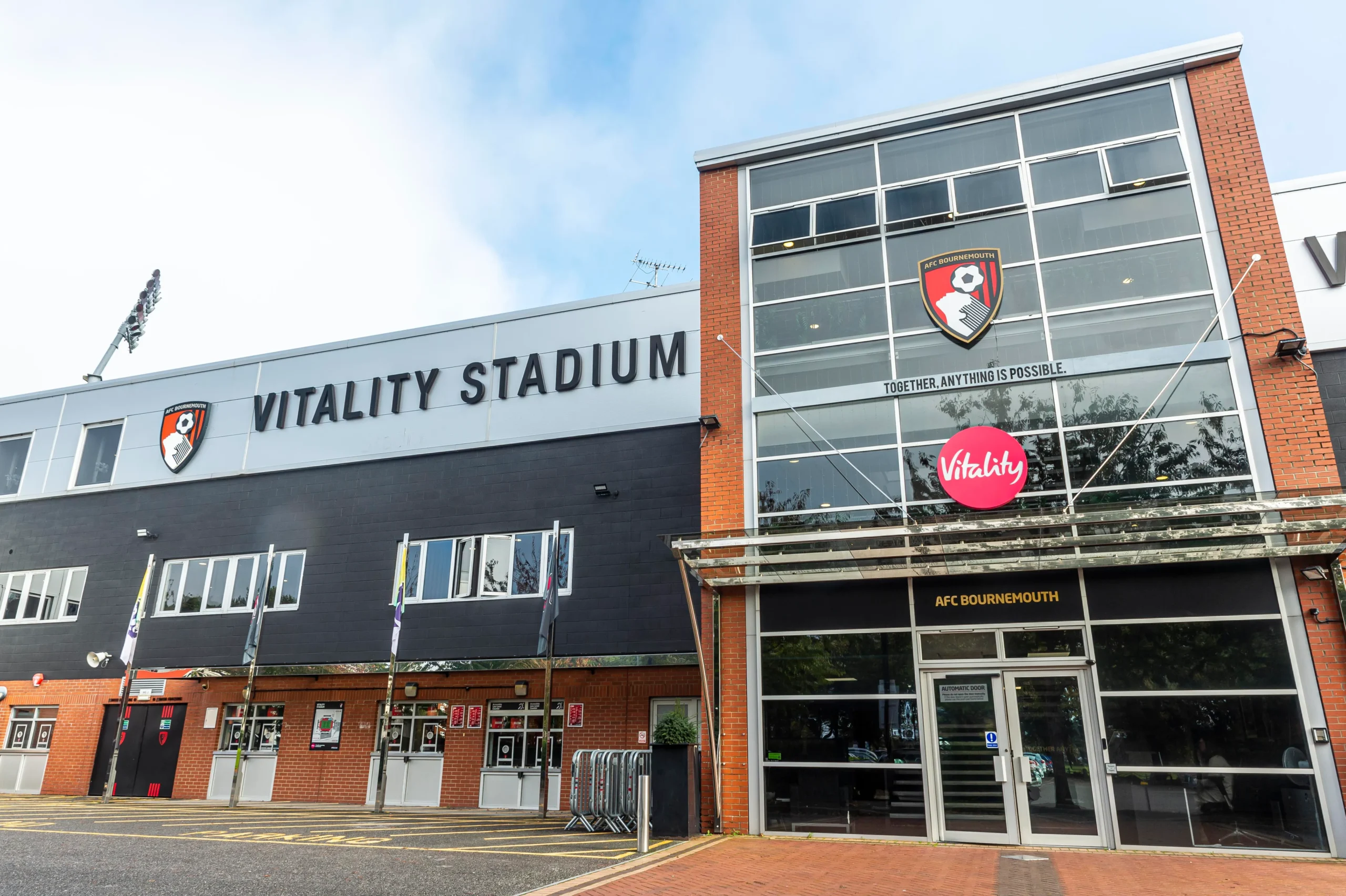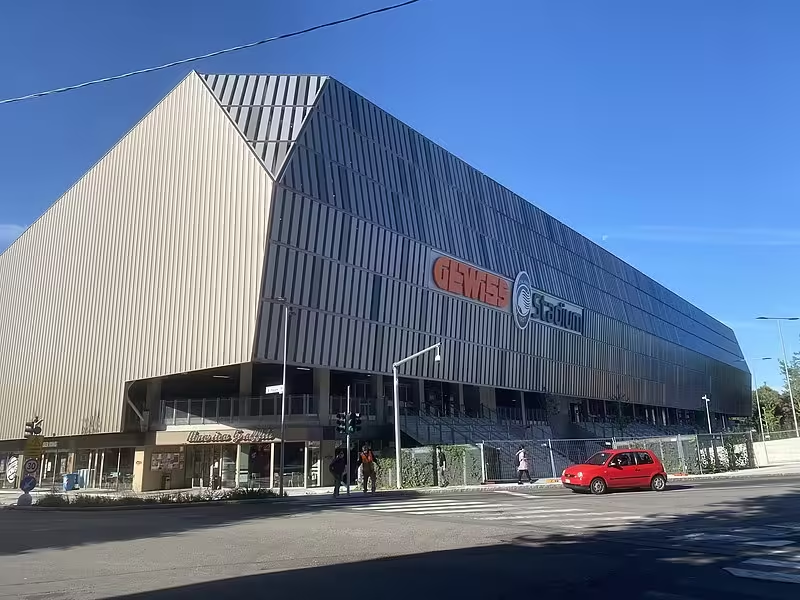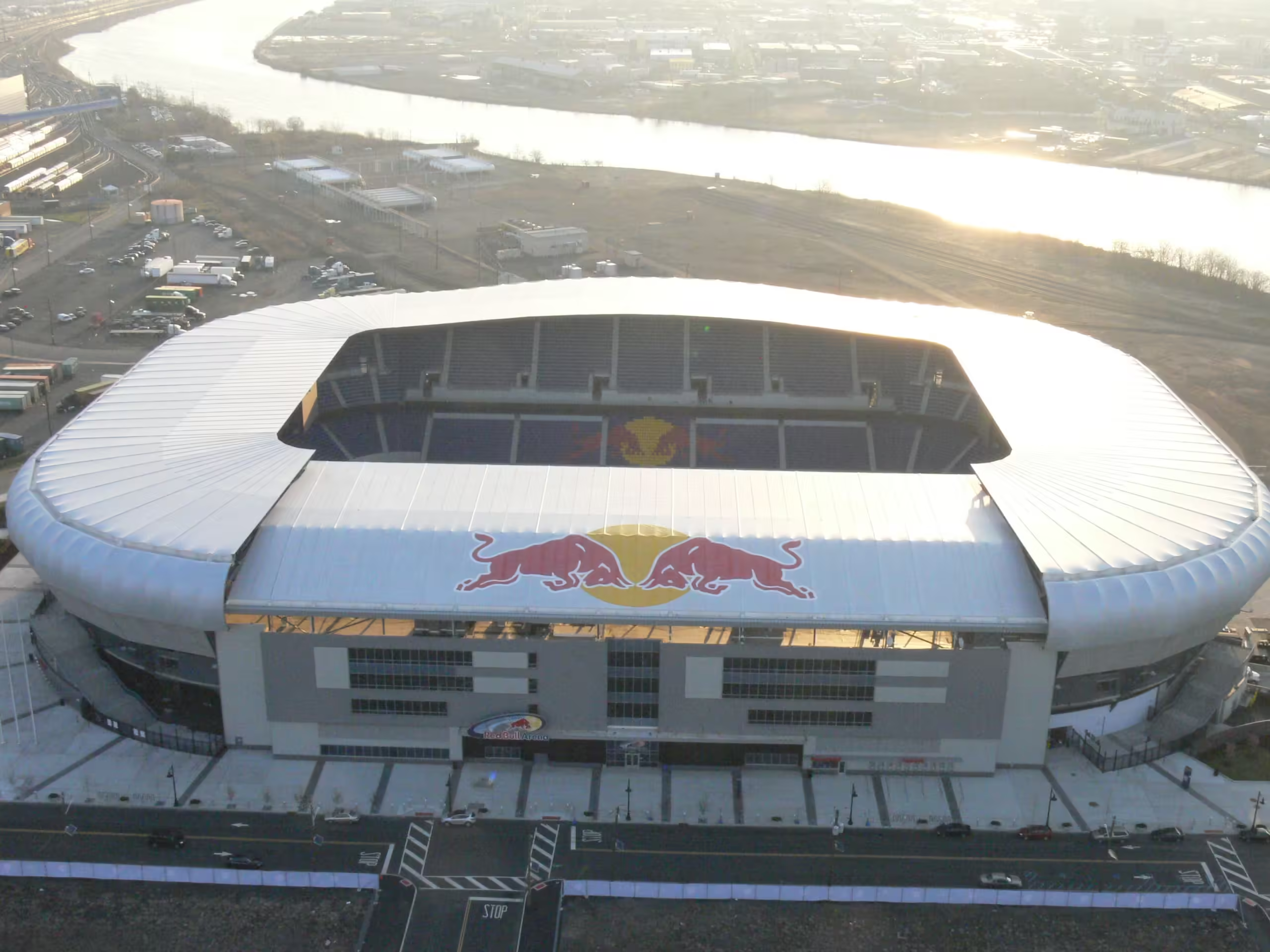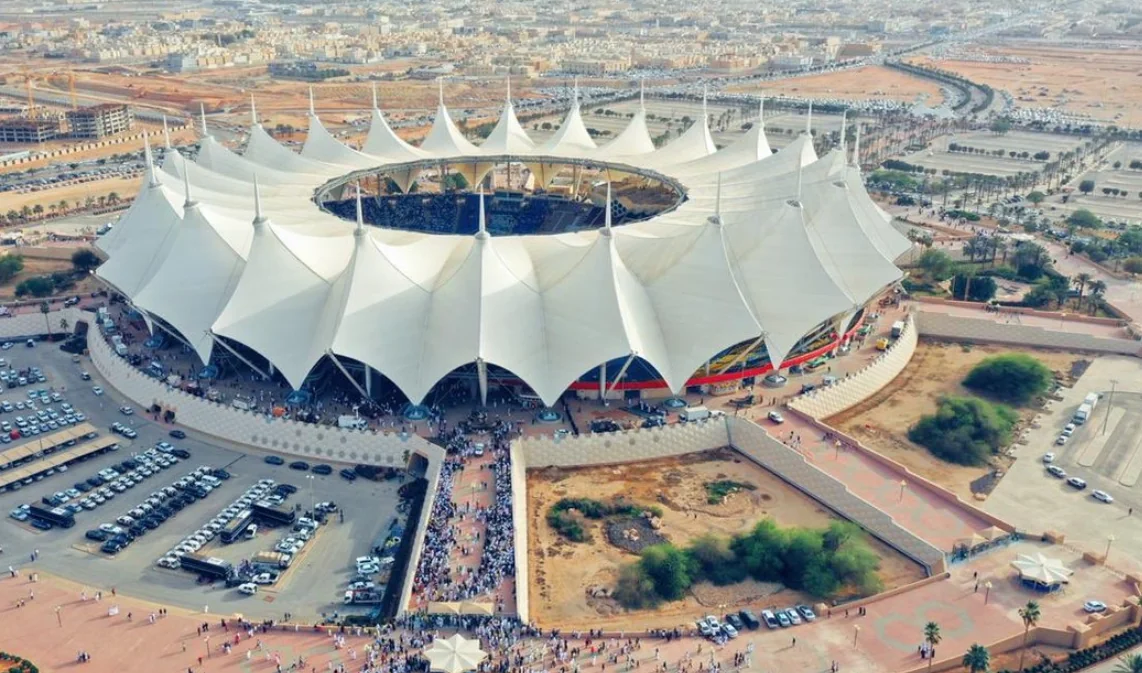Welcome to Dean Court, the Home of AFC Bournemouth. Nestled in Kings Park, Boscombe, on the outskirts of Bournemouth in Dorset, England, Dean Court—known as the Vitality Stadium due to a sponsorship agreement—is more than just a football ground. It’s a symbol of resilience and an emblem of the local community, housing the beloved AFC Bournemouth, a football club steeped in tradition and a loyal following.
Since its inception, Dean Court has evolved to meet the football club’s and its supporters’ changing needs. It has undergone various renovations and expansions, transitioning from a modest stadium to a more modern facility. Today, the Vitality Stadium is recognized for its intimate atmosphere and energetic crowd and its strategic location in a bustling area of Bournemouth.
The Vitality Stadium hosts AFC Bournemouth’s home matches, providing a vibrant backdrop for both local and visiting fans. Its name reflects the sponsorship by Vitality, a health and life insurance company that secured naming rights. This commercial partnership is a significant source of revenue for the football club, supporting its development and allowing it to remain competitive in English football.
Kings Park, where the stadium is situated, is easily accessible from different parts of Bournemouth, making it a convenient destination for football enthusiasts. The stadium’s location within a residential neighborhood adds to its unique charm, offering visitors a sense of being close to the community. With a seating capacity that creates a lively and engaging environment, Dean Court—now the Vitality Stadium—remains an iconic part of Bournemouth’s football culture.
From Gravel Pit to Glory: The Evolution of Dean Court, AFC Bournemouth’s Historic Home
The Beginnings of Dean Court
In 1910, Boscombe F.C. acquired a piece of land from the Cooper-Dean family, setting the stage for the creation of Dean Court. Named after its benefactors, the ground was once an old gravel pit, and delays in construction forced the team to play at King’s Park. When the team moved to Dean Court in December 1910, the facilities were still incomplete, and players had to change in a nearby hotel. Despite these early challenges, a modest 300-seat stand was among the first improvements.
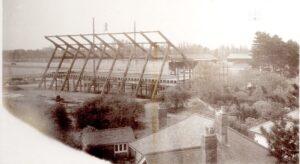
Rise to Football League and Stadium Expansion
In 1923, Boscombe F.C. joined Division Three South of the Football League and renamed itself Bournemouth & Boscombe Athletic. On 1 September 1923, the club played its first Football League match at Dean Court, drawing 7,000 fans for a scoreless draw against Swindon Town. With the acquisition of fittings from the British Empire Exhibition, the club was able to construct a 3,700-seat stand. By 1936, a covered terrace graced the southern end of the ground, further elevating the fan experience.
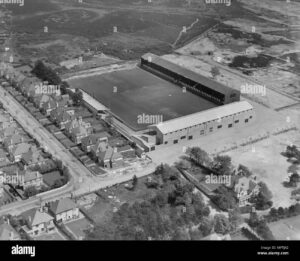
Record-Breaking Moments and Financial Hurdles
Dean Court’s record league attendance was set on 14 April 1948, with 25,495 fans watching a close 1-0 defeat to QPR. The overall record attendance was achieved on 2 March 1957, when 28,799 spectators witnessed an FA Cup clash against Manchester United. This era saw the addition of a roof to the western stand. However, financial constraints in 1984 halted ambitious plans to build a leisure center on-site, leading to the demolition of a half-completed structure.
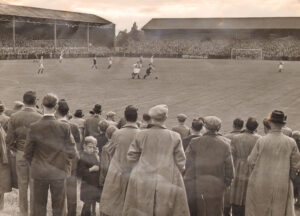
Reconstruction and New Beginnings
The stadium underwent a complete reconstruction in 2001, with a reoriented pitch and a relocation away from nearby housing. Due to construction delays, Bournemouth played their first eight matches of the 2001-02 season at the Avenue Stadium in Dorchester. When Dean Court reopened in November 2001, it was renamed the Fitness First Stadium, featuring a new three-sided design with a capacity of 9,600. A temporary stand was added to the southern end in 2005 but was later removed during the 2011-12 season due to a decline in attendance.
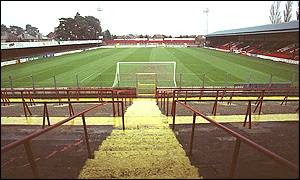
Ownership Changes and New Stand Development
In December 2005, Bournemouth sold Dean Court to Structadene, a London property company, under a sale-and-leaseback agreement. Sponsorships led to various name changes, with Seward Stadium in 2011 and Goldsands Stadium in 2012. After the club’s promotion to the Championship in 2013, a new 2,400-seat stand was constructed at the previously undeveloped end of the ground. Named the Ted MacDougall Stand after a legendary club striker, it symbolized the club’s steady growth.
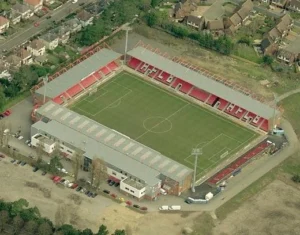
A Constant in AFC Bournemouth’s Journey
Despite multiple changes and evolving circumstances, Dean Court—now known as the Vitality Stadium—has remained a central part of Bournemouth’s football culture. It stands as a testament to the club’s enduring spirit and resilience, growing and adapting alongside the team’s fortunes in the ever-changing world of English football.
Plans for Further Redevelopment at Vitality Stadium
Expanding the Home of AFC Bournemouth
In August 2014, AFC Bournemouth chairman Jeff Mostyn revealed that the club was exploring the potential to redevelop the stadium instead of relocating to Matchams. With a capacity of only 11,464—small even for a League One club—the stadium held the distinction of being the smallest in the Premier League until the promotion of Luton Town FC in 2023. Given the club’s success and growing fan base, there was a need to increase capacity.
To address this, the club considered building a new permanent stand and filling in the stadium’s corners to boost total seating capacity to around 14,000. Such expansion would allow the club to accommodate more fans and create a better matchday atmosphere. In July 2015, the stadium’s naming rights changed to Vitality Stadium, a move that signaled a new chapter in the ground’s history.
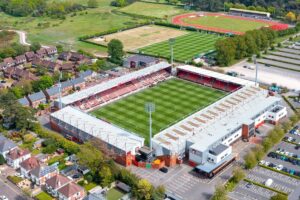
Challenges and Delays in Expansion
In May 2016, Bournemouth announced that they would not be increasing the stadium’s capacity in time for the following Premier League season. The club cited ongoing negotiations with the stadium’s landlord regarding ownership as the reason for the delay in redevelopment. A statement from the Cherries emphasized the high demand for tickets, which far exceeded the stadium’s limited capacity.
These complications led to further reconsideration of the club’s plans. Despite the urgent need for expansion, the uncertainties surrounding ownership forced Bournemouth to put off immediate redevelopment. The club’s intention to upgrade the stadium’s capacity was clear, but resolving property issues became a significant hurdle.
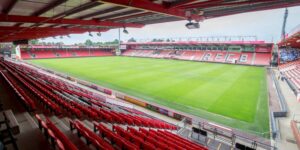
Seeking a New Home
By December 2016, the club announced its intention to find a new site due to persistent challenges related to stadium ownership. This led to renewed efforts to secure a more stable long-term solution for the club’s home ground. In July 2017, AFC Bournemouth confirmed it was considering building a new stadium near the current site in Kings Park. These plans indicated the club’s commitment to ensuring it could meet the demands of its Premier League status while providing a better experience for its loyal supporters.
Vitality Stadium Sustains Damage During Storm Eunice
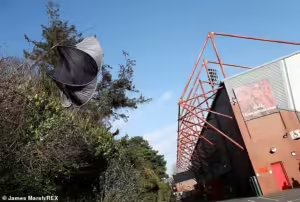
In February 2022, Storm Eunice unleashed its fury across the UK, causing widespread chaos and leaving a trail of damage in its wake. Vitality Stadium, home to AFC Bournemouth, was not spared from the storm’s wrath.
The intensity of Storm Eunice was unprecedented, with ferocious winds toppling trees, ripping off roof tiles, and causing widespread power outages. At Vitality Stadium, the storm’s force was so severe that it led to structural damage, compromising the safety of the facility.
As a result of the storm’s impact, the EFL Championship match against Nottingham Forest, which was set to take place on 18 February, had to be postponed. The decision was made in the interest of safety, as the damage rendered parts of the stadium unstable and unsuitable for hosting a large-scale event.
The postponement was a disappointment for fans and players alike, but the severity of the storm left the club with no choice. While AFC Bournemouth’s ground staff and engineers worked quickly to assess and repair the damage, the club’s primary concern was ensuring the safety and security of everyone involved.
The delay due to Storm Eunice highlighted the vulnerability of sports venues to extreme weather events and served as a reminder of the importance of safety measures and contingency planning. Despite the setback, the quick response by the club’s management and staff ensured that repairs were carried out efficiently, allowing the stadium to be ready for future fixtures.
Overall, the incident underscored the resilience of both the club and its supporters, demonstrating that even in the face of nature’s most violent outbursts, the football community remains united and determined to overcome any challenge.
Seating Plan and Best Spots to Watch a Game at Vitality Stadium
Vitality Stadium, home to AFC Bournemouth, is known for its intimate atmosphere and dedicated fans. With a traditional four-sided design, each stand has its own unique character and offers a distinct matchday experience. Here’s a guide to help you choose the best seat for your next visit.
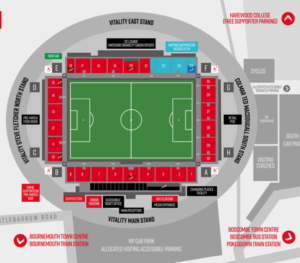
The Vitality Main Stand
The Main Stand is the heart of Vitality Stadium, hosting nearly 3,500 fans in a mix of seating options. It houses the club’s VIP section and conference facilities, and also features two family stands and a junior fanzone, making it an excellent choice for families with kids. If you’re looking for a premium experience with a great view of the pitch, this is the stand for you.
Colmar Ted MacDougall Stand
Opened in 2013, the Ted MacDougall Stand is the newest addition to Vitality Stadium. It has already seen some memorable moments, including matches against top international teams like Real Madrid. With its modern design and excellent sightlines, this stand is a great spot to catch all the action.
Vitality Steven Fletcher Stand
Named after the iconic Bournemouth striker, the Steven Fletcher Stand is where the most loyal and vocal Cherries fans gather. With a capacity of just under 2,500, it’s known for its spirited atmosphere and non-stop chanting. If you love the energy and passion of football, this stand will not disappoint.
The Vitality East Stand
The East Stand is versatile, accommodating around 3,500 fans, with 1,500 seats reserved for away supporters. It’s strategically located to offer an excellent view of the pitch, making it a favorite among many fans. If you enjoy mingling with visiting supporters or want a broad perspective on the game, this is a great choice.
Whichever stand you choose, you’re sure to experience the vibrant energy that makes Vitality Stadium a special place to watch football. Each section brings something unique, from family-friendly zones to passionate fan groups. So, grab your ticket, find your seat, and get ready for an unforgettable matchday experience at Vitality Stadium!
Capacity and Atmosphere
The Vitality Stadium, with a seating capacity of approximately 11,329, may be smaller than some other football grounds, but it more than makes up for it with its vibrant and electric atmosphere. The compact size brings fans closer to the action, creating an unforgettable and intense experience on matchdays. The energy and passion that fill the stadium are unmatched, making it a unique destination for football enthusiasts.
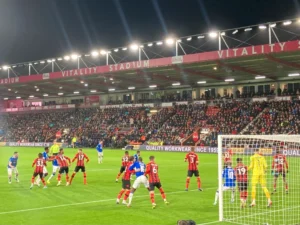
Getting to the Vitality Stadium
Located in Kings Park, just a stone’s throw from Bournemouth’s town center, the Vitality Stadium is easy to reach by various modes of transport:
- By Car: Take the A338 towards Bournemouth and follow the signs to the stadium. There’s ample parking available for both home and away supporters.
- By Train: Bournemouth’s main train station is the nearest, and from there, you can take a short taxi ride or catch a local bus to the stadium.
- By Bus: Several bus routes connect the stadium to different parts of Bournemouth, providing easy access for fans coming from within the town or further afield.
- By Bike: Bournemouth encourages sustainable transportation, with dedicated bike lanes and paths leading to the stadium, making cycling an eco-friendly option for getting to the game.
Hospitality Tickets and Tours
For those looking to elevate their matchday experience, the Vitality Stadium offers various hospitality packages. These include access to premium seating areas, exclusive lounges, and upscale dining options. Additionally, you can delve into the stadium’s history with guided tours that take you behind the scenes, offering a glimpse into the inner workings of AFC Bournemouth. Don’t miss the Bournemouth Football Club Museum, where you can explore the club’s storied past through a collection of memorabilia and exhibits.
Surrounding Area
The area surrounding the Vitality Stadium offers plenty of options for fans looking to make a day or weekend of their visit:
- Pubs: Enjoy a pre- or post-match drink at one of the local pubs or bars. These lively spots are perfect for mingling with other fans and soaking in the atmosphere.
- Hotels: Whether you’re seeking luxury accommodations or budget-friendly options, Bournemouth has a range of hotels to suit your needs.
- Attractions: While in town, explore Bournemouth’s famous beaches, lush gardens, and cultural landmarks. There’s something for everyone, from art lovers to outdoor enthusiasts.
Dining, Refreshments, and Accommodation near the Vitality Stadium
Here’s a quick guide to the dining, drinking, and accommodation options near the Vitality Stadium.
Eating and Drinking
The Vitality Stadium is in a quiet residential area, so there are limited choices for dining and drinking nearby. You can find a local pub for a quick drink, but for more variety, head to Bournemouth’s lively town center. Just a short drive or bus ride away, you’ll find a vibrant mix of restaurants, cafes, and pubs offering everything from casual snacks to fine dining. Whether you crave traditional British fare or international cuisine, Bournemouth has something for everyone.
Accommodation
Although there aren’t any hotels right next to the Vitality Stadium, Bournemouth’s town center offers plenty of accommodation options to suit all budgets and preferences. From luxury hotels to cozy guesthouses and budget hostels, you can find a place to stay that fits your style. If you’d prefer to stay closer to the stadium, there are a few accommodation choices in Boscombe, but be aware that while the area has improved, some visitors still have safety concerns.
With these options for dining, drinking, and accommodation, your visit to the Vitality Stadium is sure to be enjoyable both during the game and in the surrounding areas.
Bournemouth Ticket Information
Secure your spot at Bournemouth games by purchasing tickets conveniently through various channels. Tickets are available for purchase online, via phone at +44 (0) 344 576 1910, or in person at the ticket office located at the Vitality Stadium. Additionally, you can visit the BIC & Pavilion ticket office on Exeter Road, just off The Square in Bournemouth’s bustling town center.
Ticket prices vary depending on seating location, ranging from £32.00 for seats behind the goal to £45.00 for central seats in the Main Stand.
With Bournemouth’s matches regularly selling out, especially during their first season in the Premier League, securing tickets may require accruing a certain number of loyalty points.
For further inquiries or assistance, you can reach out via email at tickets@afcb.co.uk or by calling +44 (0) 344 576 1910.
In Conclusion
The Vitality Stadium is more than just a football ground—it represents the spirit and legacy of AFC Bournemouth. Its unique atmosphere, combined with the club’s rich history, makes it a must-visit destination for football fans and travelers alike. Whether you’re here for the football, the history, or the local attractions, the Vitality Stadium promises an experience that is both thrilling and memorable.
Other Stadiums Articles:
Also Check: Victories and Evolution in English Football: Recently opened Stadiums (since 2020)
Also Check: Emirates Stadium (Home of Arsenal): A Journey Through History
Also Check: Goodison Park Stadium (Home of the Blues “Everton FC”): A Pioneering History
Also Check: Old Trafford: The Iconic Theater of Dreams
Also Check: Europe’s Top 10 Largest Sports Stadiums
